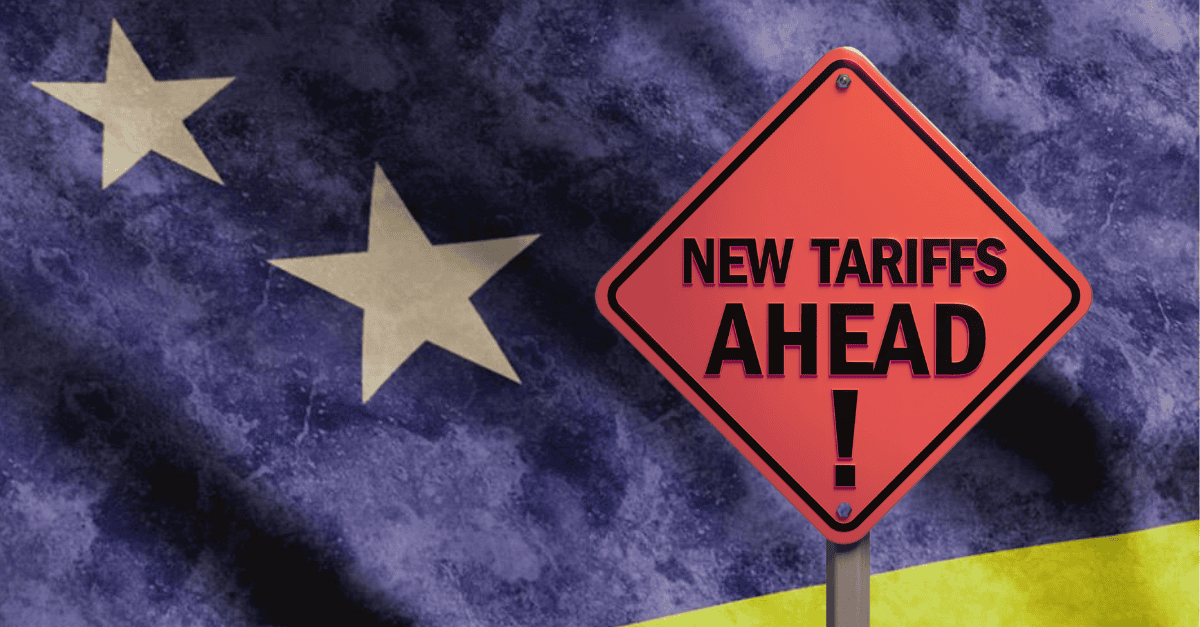
Trade War Impacts Curaçao
The recent increase in import tariffs by the United States has triggered a global trade war. From China returning Boeing airplanes to implementing tariffs exceeding 100%, action has led to reaction, and there’s no end in sight. For small, open economies like Curaçao, the consequences are very real.
On April 2, 2025, U.S. President Donald Trump announced a general 10% import tariff on all goods entering the country. In addition, reciprocal tariffs were introduced, including a 20% levy on imports from the European Union and a 34% tariff on goods from China. These measures aim to address trade imbalances and protect U.S. businesses from foreign competition. In response, several major U.S. trade partners have announced countermeasures. However, the situation remains uncertain, especially amid rising tensions between the U.S. and China. Trade policies may continue to change or be temporarily suspended, adding to global concerns about potential disruptions in international supply chains, inflationary pressure, and the risk of a global economic slowdown.
Import tariffs, taxes on goods brought in from abroad, make foreign products more expensive. While importers officially pay these duties, the added costs are often passed on to consumers through higher retail prices. Countries typically impose import tariffs to protect domestic industries by making local products more attractive and to generate government revenue. However, tariffs come with drawbacks: they disrupt the principle of comparative advantage, where countries focus on producing goods efficiently. This can lead to inefficient use of labor and capital, hinder innovation, and ultimately slow economic growth. Tariffs also contribute to inflation, impacting consumer purchasing power. The overall effect often results in a net loss of welfare, with consumers bearing more cost than the benefits received by producers. Retaliatory tariffs can then spiral into a full-blown trade war, causing economic damage, straining trade relationships, and creating uncertainty for global businesses, with long-term consequences for international cooperation and stability.
The United States is Curaçao’s most important trading partner. As a small economy heavily dependent on international trade, particularly the import of raw materials, intermediate goods, and consumer products, Curaçao is vulnerable to external price increases. Build-up in global tariffs, whether imposed by other countries or by Curaçao itself, can significantly raise the cost of imported goods. For local small and medium-sized enterprises (SMEs), which often operate with limited margins and scale, these cost increases are particularly impactful. Although Curaçao’s export volume is relatively small, U.S. trade policies can still have indirect effects on both economies. Rising import costs in the U.S. will likely be passed on to consumers, pushing inflation higher. Since Curaçao depends heavily on U.S. imports, inflation in the U.S. can spill over to its economy. Higher prices reduce consumer purchasing power, lower domestic demand, and slow economic growth. Additionally, supply chain disruptions, rising raw material prices, fluctuating exchange rates, and new trade barriers contribute to growing uncertainty for both businesses and consumers. A decrease in purchasing power in the U.S. and Europe could also dampen demand for international travel, negatively impacting Curaçao’s tourism sector.
The Central Bank of Curaçao and Sint Maarten has analyzed the potential impact of U.S. trade tariffs on the economies within the monetary union. In the first scenario, the U.S. implements tariffs without retaliatory measures from trade partners. This results in a slight decline in trade flows and business confidence in the U.S., with higher import costs passed on to consumers. While the impact on Curaçao is limited, it’s not negligible. Rising import costs lead to higher inflation, which reduces household purchasing power and disposable income, resulting in lower private consumption and
investment. Consequently, the demand for imports decreases, particularly in tourism-related sectors.
In a second, more severe scenario, major trade partners retaliate, escalating the situation into a global trade war. This would have far-reaching effects: global demand declines, international supply chains are disrupted, and business confidence drops significantly. This escalation hampers global trade and investment, placing additional pressure on supply lines worldwide. Inflation is expected to rise further among other key partners of the monetary union, such as the Netherlands, France, and Canada, amplifying the economic effects on Curaçao. Under this scenario, real economic growth in Curaçao is projected to be lower in 2025 than in the baseline scenario, while inflation increases. Rising prices further suppress domestic demand, particularly household consumption. Simultaneously, weaker economic growth in major markets like the U.S. and the Netherlands leads to lower export income and a drop in tourism-related spending. Imports also decline, driven by reduced domestic demand and tourism consumption.
In short, recent U.S. import tariffs are indirectly putting economic pressure on Curaçao, especially through rising import costs and inflation. This reduces purchasing power, slows down consumption, and weakens economic growth. From a fiscal perspective, this may lead to lower revenues from import duties and indirect taxes, while increasing pressure on public spending. It is therefore crucial that Curaçao anticipates and prepares for these external developments in a timely manner.
By Lennart Huijsen, Partner & Tax Advisor at Grant Thornton Curaçao (lennart.huijsen@cw.gt.com) and Haesle Soerka, Tax Advisor at Grant Thornton Curaçao (haesle.soerka@cw.gt.com).

